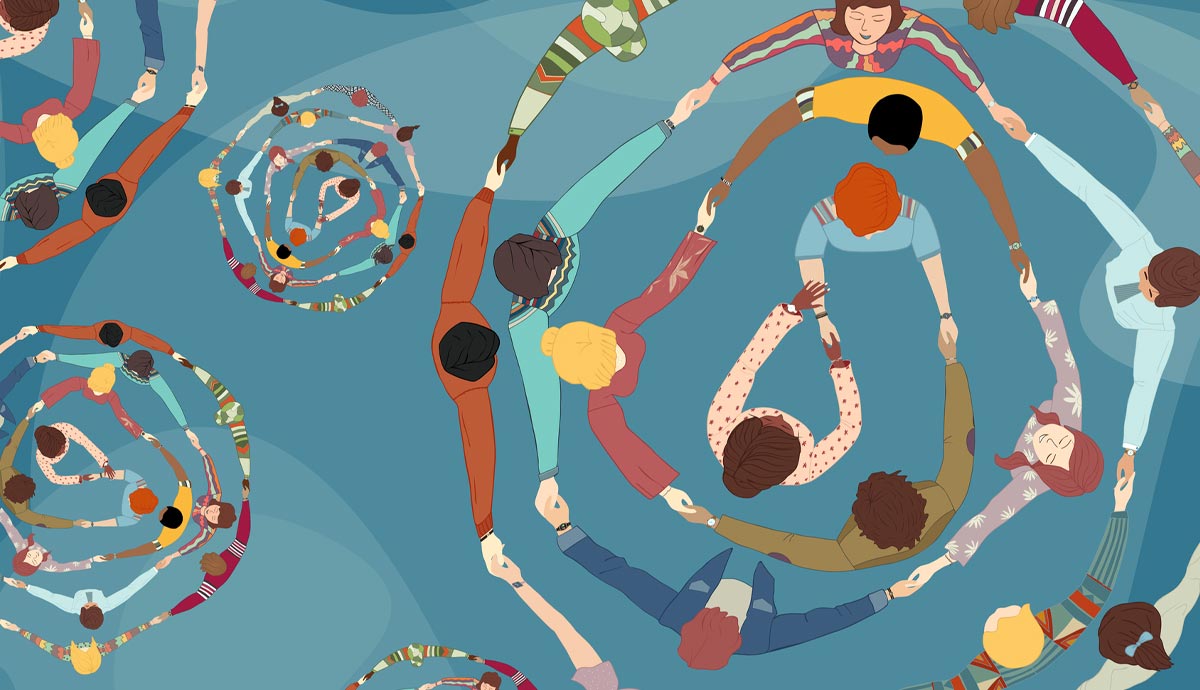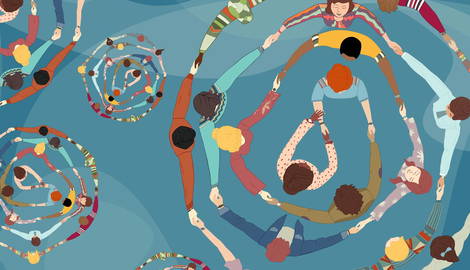
Communitarianism is a political philosophy born from opposition to and critique of the work of liberal political philosophers, especially the work of John Rawls. In this article, we will explore the main arguments communitarian philosophers such as Alasdair MacIntyre, Michael Sandel, and Amitai Etzioni raise against the liberal project, paying particular attention to their objections to liberalism’s view of the self and understanding of the value of community.
The Origins of Communitarianism: Rawls’ Theory of Justice

Communitarian ideas have a long history. The germ of communitarian thinking can be found, for example, in Aristotle’s works on politics and later in Hegel’s thought. Communitarianism as a philosophical movement, however, came of age in the late twentieth century as a critical reaction to John Rawls’ 1971 work A Theory of Justice.
In order to properly understand communitarianism, therefore, we first need a brief outline of what Rawls argues in his seminal work. In a nutshell, Rawls argues that a just society is a society based on two principles. The first principle holds that all people should have equal rights. The second principle holds that economic inequality is only permissible if it is: a) attached to offices and positions open to all on the basis of equality of opportunity, and b) to the benefit of the worst off.
In other words, it is only permissible for some people to have more income or wealth than others if any other distribution of goods (say absolute equality of income) would, overall, lead to those who have the least having less than they would under an unequal regime.
The Veil of Ignorance

John Rawls argues for these principles with a hypothetical thought experiment. These principles, he argues, are the principles that would be chosen if people were forced to decide how to organize society behind the ‘veil of ignorance’ which denies them knowledge of their actual circumstances.
In other words, these two principles would be the principles a group of hypothetical decision-makers would choose if they didn’t know whether they would be healthy or unhealthy, what race they would be, whether they were heterosexual or not, what their gender was, whether they were born rich or poor, whether or not they had talents that enabled them to earn lots of money, and in ignorance of what they found valuable and meaningful in life.
Under these conditions, Rawls posits, we would seek to ensure that we all had equal rights which granted us ample freedom, and we would seek to ensure that those who have it worse in society have it as good as possible.
The Communitarian Self Vs. the Liberal Self

Communitarians take issue with Rawls’ view of justice for two main reasons. First, they argue that liberals such as Rawls misconstrue the true nature of the self. Rawls’ veil of ignorance and the contractualist method used to derive the two principles of justice are unduly individualistic. The self, according to communitarians, can’t be neatly distinguished from society. Humans, they argue, are inherently social, a fact that contractualist views such as Rawls’ ignore.
In his 1998 book Liberalism and the Limits of Justice, Michael Sandel argues that Rawls (and other broadly Kantian liberals) make the mistake of conceiving people as prior to their ends. In Sandel’s words:
For justice to be primary, certain things must be true of us. We must be creatures of a certain kind, related to human circumstance in a certain way. In particular, we must stand to our circumstance always at a certain distance, conditioned to be sure, but part of us always antecedent to any conditions (Sandel, 1998, p. 10)
In the original position, people are required to choose the principles of justice without knowing what their ends in life are. This, Sandel argues, is a mistake because our ends in life constitute us as people (Beiner, 1992, p. 16). The independence of the self, on this view, ‘…is a liberal illusion. It misunderstands the fundamentally ‘social’ nature of man, the fact that we are conditioned beings ‘all the way down’. There is no point of exemption, no transcendental subject capable of standing outside society or outside experience.’ (Sandel, 1998, p. 11).

This self, Sandel argues, is an impoverished self. The self without attachments is not a free self, but a self without character, ‘for to have a character is to know that I move in a history I neither summon nor command, which carries consequences none the less for my choices and conduct. It draws me closer to some and more distant from others; it makes some aims more appropriate, others less so.’ (Sandel, 1998, p. 179).
If this is true, this has deep political consequences that cut to the heart of the liberal project. The liberal project’s goal of trying to be neutral between conceptions of the good by not making policy decisions in such a way that some groups (e.g., Christians or atheists) are excluded is misguided. Individuals have conceptions of the good, as do societies, and trying to shy away from this is a mistake. Instead, we should shape and direct policy to promote these social conceptions of the good.
The Value of Community

The second main objection communitarians have towards Rawls’ conception of liberalism is that it devalues community.
In the broadest sense of the term, a community is “a group of people who share a range of values, a way of life, identify with the group and its practices and recognize each other as members of that group” (Mason 2000: 4). Within this definition, however, there is scope for variation. Community, for example, exists at various levels. Some communities are local, others are national, others are supranational.
Communities also come in different types. Some are based on joint membership in a political system, others are based on ethnicity or religion. Some are geographical (e.g., national communities), and others are based on shared interests or professional activities. The sorts of communities communitarians are concerned about are local communities and political communities.
By local community, they mean a group of people who live in a small geographical area like a neighborhood or town and who are connected to each other through a network of social relationships and bonds of affection (Etzioni 1993: 243). Not all of these bonds are equally deep; the affection in mind is not only the affection of intimate friends but also includes the general well-wishing of civic relationships (Clor 1996: 52). Some members of the community will also be enmeshed in denser networks than others. As a consequence, not all members of the local community know each other or relate to each other.

By political community, communitarians mean an association of citizens living under a political arrangement. Unlike local community, the group of people who make up a political community do not generally have face-to-face relations with most of their co-citizens. What binds people into a political community are not primarily bonds of affection between all co-citizens but the fact they are subject to the same political institutions (Frazer 1999: 219), which define their legal obligations to (and rights against) each other and their political institutions.
Members of a political community are co-citizens and, in a democratic society, co-participants in the political process (Kymlicka 1989: 135). This participation can take many forms, such as voting, petitioning, or standing for office, as well as less formal forms of political engagement, such as protesting, striking, sharing pamphlets, or engaging in civil disobedience.
Liberals such as Rawls see communities as being mainly instrumentally valuable. In other words, community is only valuable because of the benefits people derive from cooperating with others in pursuit of their individual ends.
This, communitarians argue, is a mistake. Contra liberals like Rawls, community is intrinsically valuable. Members of a community have shared ends, and pushing these ends alongside other members of a community is good in and of itself. That is, regardless of the personal, individual benefits people derive from cooperating.
Communities, in this view, aren’t simply aggregations of individuals. Instead, ‘…a community is a particular kind of social group in which men believe they share something together. The feeling of community is fraternal, it involves something more than the recognition that men need each other materially. The bond of commitment is one of sensing common identity, a pleasure in recognising ‘use’ and ‘who we are’.’ (Sennet, 2021, p. 31).
References:
Beiner, Ronald. (1992) What’s the Matter With Liberalism. University of California Press, Berkley.
Clor, Harry L. (1996) Public Morality and Liberal Society. University of Notre Dame Press, Notre Dame.
Etzioni, Amitai (1993) The Spirit of Community. Crown Publishers. New York.
Frazer, Elizabeth. (1999) The Problems of Communitarian Politics. Oxford University Press, Oxford.
Kymlicka, Will. (1989) Liberalism, Community and Culture. Clarendon Press, Oxford.
Rawls, John. (1971) A Theory of Justice. Harvard University Press, Cambridge MA.
Sandel, Michael. (1998) Liberalism and the Limits of Justice. Cambridge: Cambridge University Press.
Sennet, Richard. (2021) The Uses of Disorder: Personal Identity and City Life. Verso Books, London.










